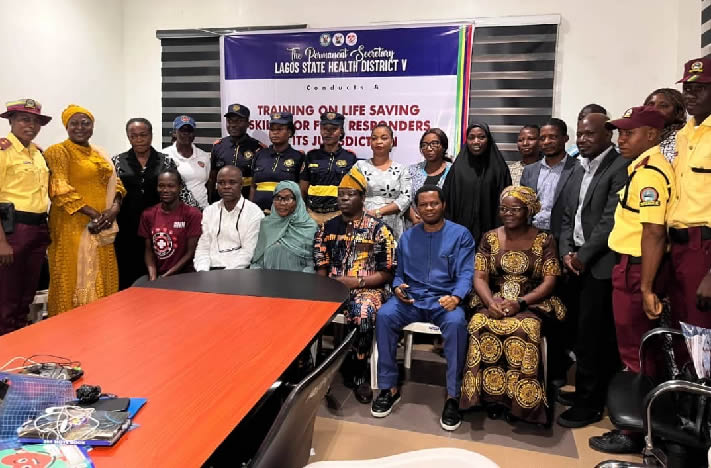The Lagos State Health District V, in a proactive move to enhance emergency response capabilities within its jurisdiction, recently conducted a comprehensive two-day capacity-building training program. This initiative focused on equipping first responders, including personnel from the Lagos State Traffic Management Authority (LASTMA), the Neighbourhood Safety Corps, and teachers, with essential life-saving skills. Recognizing the critical role these individuals play in their respective domains, the training aimed to empower them to act decisively and effectively during emergencies, particularly those occurring on highways, in schools, and within local communities. By providing these frontline individuals with the necessary knowledge and practical skills, the Health District V seeks to create a more resilient and responsive environment where prompt and appropriate action can significantly improve outcomes in emergency situations.
The training program, themed “Training on Life-Saving Skills for First Responders,” covered a wide range of crucial areas. Participants received instruction in cardiopulmonary resuscitation (CPR), a vital technique for reviving individuals experiencing cardiac arrest. They were also educated on fundamental first aid procedures, enabling them to address common injuries and medical emergencies. The training emphasized the importance of recognizing danger signs and symptoms, equipping participants with the ability to assess situations accurately and determine the appropriate course of action. Furthermore, the program delved into shock management techniques, crucial for stabilizing individuals experiencing shock due to various causes. Recognizing the potential risks faced by first responders, the training also underscored the importance of personal safety while providing assistance, ensuring that participants can effectively help others while safeguarding their own well-being.
Dr. Oladapo Asiyanbi, the Permanent Secretary of the Lagos State Health District V, highlighted the strategic importance of this initiative. He emphasized that emergency care knowledge should not be confined solely to professional healthcare workers but should be disseminated throughout the community. This democratization of life-saving skills empowers ordinary citizens to become active participants in emergency response, creating a network of trained individuals capable of providing immediate assistance before the arrival of professional medical personnel. Dr. Asiyanbi urged all participants to become ambassadors for emergency preparedness by sharing their newly acquired knowledge with at least 50 individuals in their communities and workplaces, thereby amplifying the impact of the training and creating a ripple effect of enhanced emergency response capabilities across the state.
This training program represents the first in a series of community-based emergency preparedness initiatives planned by the Health District V. The District aims to expand the reach of this training to encompass various community stakeholders, including religious bodies, community associations, and non-governmental organizations. By extending the training to these diverse groups, the Health District V aims to establish a comprehensive network of trained first responders across different sectors of society, ensuring that emergency preparedness becomes an integral part of the community fabric. This comprehensive approach reflects the Lagos State Government’s commitment to fostering a health-conscious and responsive society where citizens are empowered to play an active role in ensuring their own safety and well-being.
The training underscores the importance of timely intervention in emergency situations. Dr. Asiyanbi stressed the critical role of first responders in providing initial care before the arrival of professional medical teams. He urged participants to utilize the state’s emergency toll-free numbers effectively, ensuring that professional help is summoned promptly while simultaneously providing essential on-site assistance. By acting as a crucial link between the incident and the arrival of professional medical personnel, first responders can significantly improve the chances of survival and positive outcomes for individuals in need.
This initiative aligns perfectly with the Lagos State Government’s broader vision of building a more resilient and health-conscious society. By empowering citizens with essential life-saving skills, the government aims to create a culture of preparedness and proactive response to emergencies. This approach not only equips individuals to handle crises effectively but also fosters a sense of community responsibility and shared ownership of safety and well-being. The training program demonstrates the government’s commitment to investing in its citizens, recognizing that a well-informed and prepared populace is essential for creating a safer and more secure environment for all.


